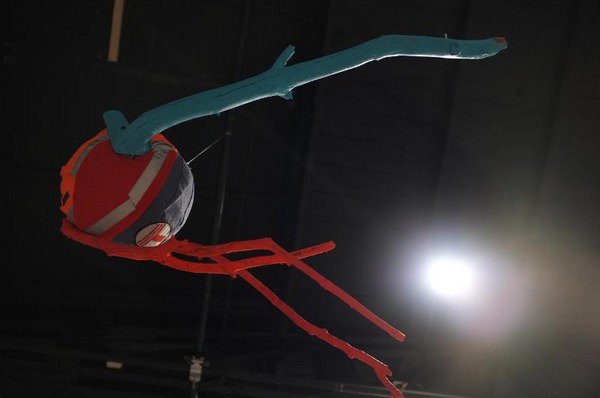Irina Korina
dal 24/3/2012 al 12/5/2012
Segnalato da
24/3/2012
Irina Korina
Scaramouche (new location), New York
Demonstrative Behavior. Her work takes the forms of columns, anthropomorphic sculptures, and architectural constructions and does not reflect the splendor of Imperial Russia. Rather, the artist seeks to illuminate the last three decades during which the Soviet Union has undergone a painful transition from socialism to its own peculiar brand of capitalism.

Curated by Yulia Tikhonova
Scaramouche is pleased to present the first U.S. exhibition of Moscow-based artist Irina Korina. Known for her oversized, elaborate installations, the artist debuts a group of compelling works conceived for the gallery space and assembled under the title "Demonstrative Behavior".
Originally trained in theater design, Korina's work takes the forms of columns, anthropomorphic sculptures, and architectural constructions. These complex configurations, with their myriad parts and appendages, bring to mind the opulent and playful stage sets of Diaghilev's Ballets Russes. Her work however, does not reflect the splendor of Imperial Russia. Rather, the artist seeks to illuminate the last three decades during which the Soviet Union has undergone a painful transition from socialism to its own peculiar brand of capitalism. With wholesale furniture markets serving as her source of inspiration, Korina utilizes makeshift materials such as veneer, plywood, fabric and plasticine. Self-adhesive faux marble or wood veneer and multi-colored plastic tablecloths with their floral patterns become her raw materials. Her childhood memories of provisional Soviet aesthetics are constantly present in Korina's work.
The new installations reflect aspects of human "Demonstrative Behavior" such as easy superficiality and conspicuous consumption. This luxury "display" has become the prevailing fashion in current Russian society and is repeatedly mocked by the inherent lack of value in Korina's surfaces. In the piece Scarecrow, she utilizes tree branches to construct a human figure wearing an orange safety vest, whose wide open arms reach out to control an unseen stream of traffic. For the work Nightmare, the artist hangs a Persian rug, a common household item in Soviet times, on the wall. In the middle she affixes the USSR's pompous coat of arms, made of plasticine, with busts of former Communist leaders on either side. The installation is a kitsch altar to the Soviet memorabilia that continues to hold a place in peoples' hearts.
One of Korina's signature-style columns dominates the gallery space. Its body is made out of steel, while the multicolored capital is constructed from woven plastic grocery bags. Borrowing from both Brancusi's Endless Column and the characteristic Russian Orthodox onion domes, the artist creates a parody of the Soviet aesthetic that once engulfed daily life in the USSR. Her column is a sly critique of the ostentatious culture that now flourishes in Russia. Meanwhile, Sputnik, an assemblage of a soccer ball and attached tree branches painted the colors of the Russian flag, occupies the gallery project space, suspended in the darkened environment. With her "bricolage" approach, Korina persistently pokes fun at the reckless and absurd behavior that accompanies Russians as they spread out around the world.
Irina Korina (1977, Moscow) is a graduate of the Russian Theater Academy, Moscow, and Kunstakademie, Vienna. She was selected to represent Russia at the 2009 Venice Biennale. Named to the 2010 Residency at the Musée d'Art Contemporain du Val-de-Marne, Paris, Korina's work has recently been featured in solo exhibitions at Bloomberg Space, London; Moscow Museum of Modern Art; Museum Folkwang, Essen; and XL Gallery, Moscow. Group exhibitions include Garage Center for Contemporary Culture, Moscow; Centro per l'Arte Contemporanea Luigi Pecci, Prato; and Museum van Hedendaagse Kunst Antwerpen, Antwerp. Korina lives and works in Moscow.
Yulia Tikhonova is a Moscow-born, Brooklyn-based curator concerned with the artistic practice of the emigrant artist, with an emphasis on those with roots in Eastern Europe.
A graduate of CCS Bard College, Tikhonova founded the Brooklyn House of Kulture, and is a regular contributor to FlashArt International, Art in America, and Art Asia Pacific.
Image: Irina Korina, Sputnik, wood, fabric, polyester, paint.
Scaramouche (new location)
52 Orchard St. New York
Hours: Wed. - Sat. 12N-6pm, Sun. 1pm-5:30pm, and by appt



